General
Mental Health Awareness Week: Mental Health and Wellness in the Workplace

The statistics around mental health in the workplace aren't great.
Work-related stress, depression and anxiety led to 9.9 million missed work days in the UK in 2014, making mental health conditions a leading causes of sickness absence in the UK.
Mental health matters
MHFA England is on a mission to change this by providing Mental Health First Aid training to members of the public, teaching them how to help a person with a mental health problem, and by educating businesses about the impact mental health problems can have on people at work.
Their goal is to train one in ten of the population in England in Mental Health First Aid skills. So far, 400,000 people in England have trained as Mental Health First Aiders – including, we're proud to say, two member of the Northcoders team. But their mission to reduce the stigma around mental health issues at work doesn't stop there.
Last month, the training provider launched a new Workplace Manifesto as part of the ‘Where’s Your Head At?’ campaign. The initiative calls for outdated Health and Safety legislation to be amended to make sure mental health is protected in the workplace. It also asks employers to recognise the need to prioritise mental health, build diverse and inclusive workplaces and treat mental and physical health equally.
Mental Health Awareness Week
Mental health in the workplace is an issue that's close to our hearts here at Northcoders. So this Mental Health Awareness Week, we wanted to open up the discussion with our community of students, alumni and friends by bringing everyone together for a night of short talks.
Our speakers shared some fantastic tips and advice for staying healthy and well at work. Here's a short roundup...
Get your ZZZ

How important is a good night's sleep to you? For Northcoders grad and self-confessed 'bouncy boy' David, the difference between a solid sleeping session and a bad one is best described in pictures...
4 hours sleep = potato brain
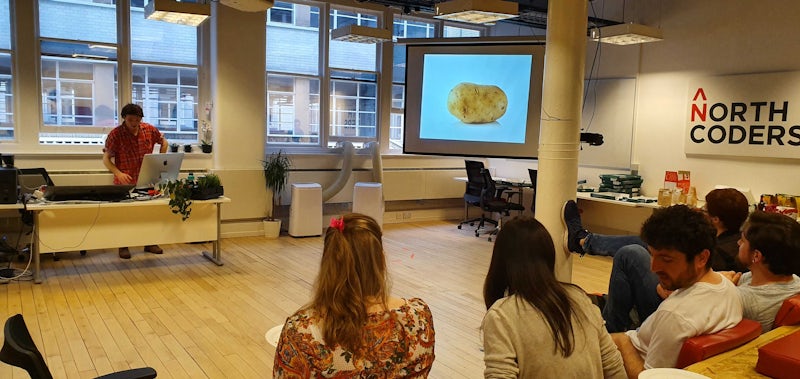
6 hours = plodding along
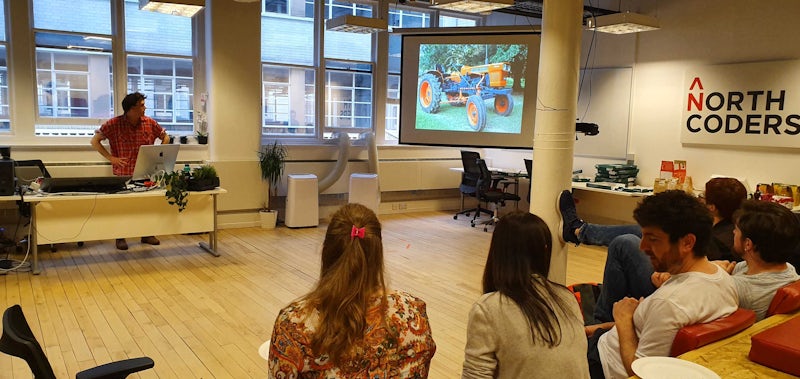
8 hours = all-powerful finely tuned machine
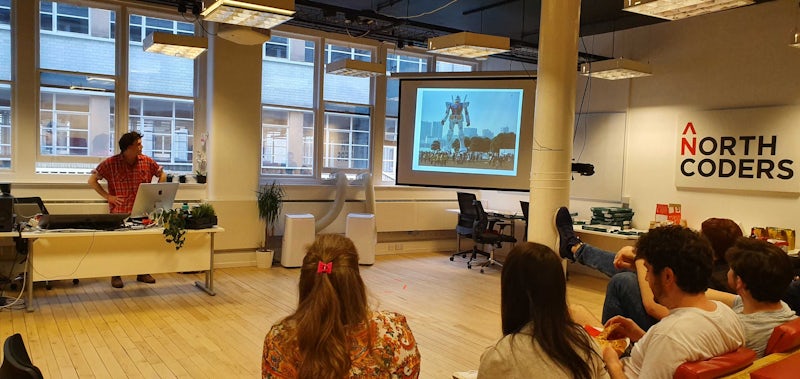
Takeaways: David looks after his mental health at work by trying to get enough sleep and exercise.
Beware burnout
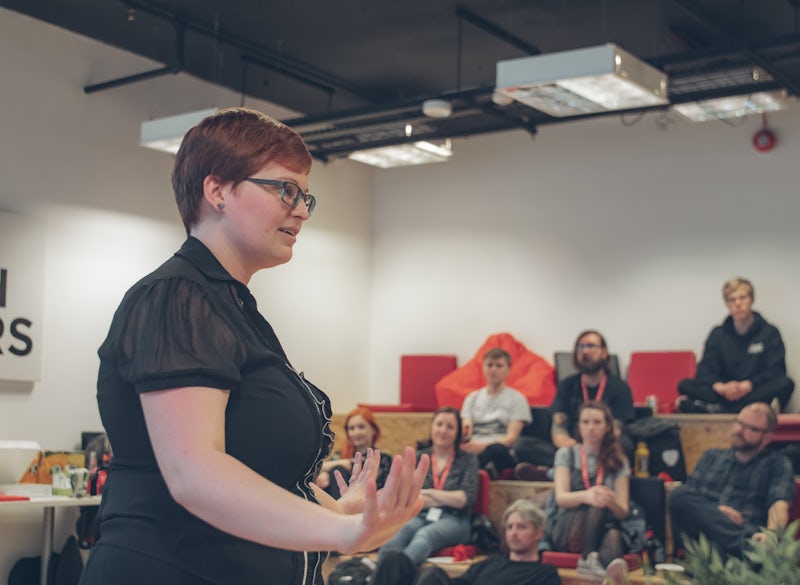
Recent graduate Kay describes herself as a perfectionist – a trait that has led to burnout in the past. She shared some coping strategies that help her avoid the destructive cycle of work, crash, repeat.
- Stop working: Step away from the keyboard, take a break and distract your brain with Judge Judy.
- Plan regular holidays: You don't need to go anywhere, just taking the time away from work is enough.
- Eat and sleep: Try to eat a healthy, balanced diet where possible and don't be tempted to work into the night. Sleep matters!
Escaping the rat race
Workplace stress led to Nick feeling increasingly frustrated and discontent, so he left his old career behind to find something he could be happy doing – training for a career in coding with Northcoders.
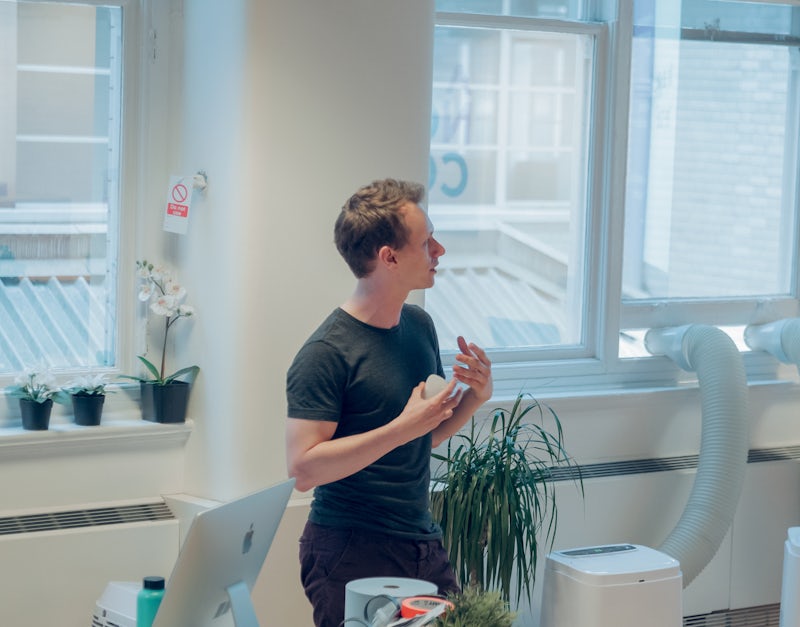
His advice? Don't be afraid to leave your own rat race – and always, always speak to your family, friends and workmates if you're struggling.
Imposter syndrome? Who? Me?

Ben graduated from Northcoders back when we were based at the Sharp Project, so it was great to have him back on campus to share his experiences with some of our more recent grads and students.
Ben worked as a musician for years, playing to sold out crowds all over the world. The only problem? He was getting bored with the same old routine.
After years in the industry, Ben was at the top of his game. He was 100% confident in his skills and ability when he decided to leave it all and retrain for a career in software development with Northcoders.
He felt sure that the confidence he had working in music would transfer across to his first role in tech. But it didn't. Instead, he felt imposter syndrome creeping up on him like an unwelcome (and unexpected) guest.
His advice for others in a similar position? Moving into a new profession can be a challenge, but don't let your imposter syndrome define your worth or affect your confidence level. Find a hobby or interest that's unrelated to work and focus on that instead so you're not fixating on work constantly.
Reducing stigma around mental health

To round off the night, we were joined by Francesca, a rep from Manchester-based mental health charity Self Help.
Self Help offer a huge range of support and services for young people and adults living with mental health difficulties, including anxiety, depression, phobias and panic attacks.
1 in 4 people will experience a mental health problem at some point in their lives, and Francesca works tirelessly to spread the word about the services and support available to people who do – services like Improving Access to Psychological Therapies (IAPT).
You might not have heard about the (IAPT) programme, but it offers treatments for people with anxiety and depression.
Over 900,000 people now access IAPT services each year via organisations just like Self Help, which has itself helped 12,900 people in Greater Manchester this year alone.
Improving mental health, one talk at a time
Thank you to everyone who joined us this week. We plan on holding regular mental health talks throughout the year, so watch this space for updates!
Lucy Adams




